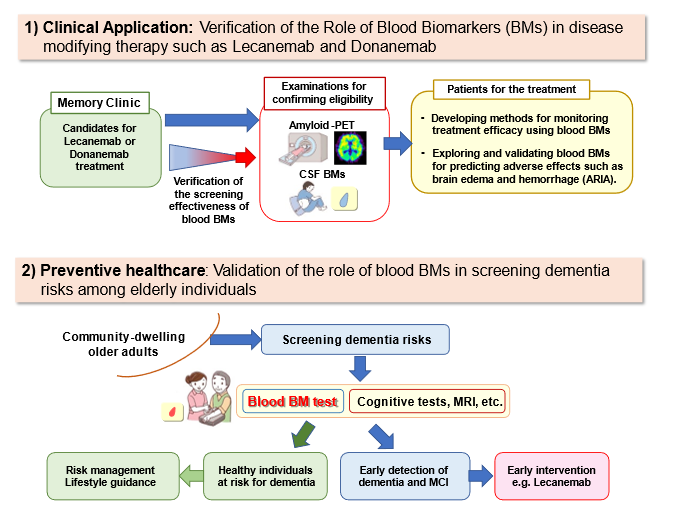Application of Blood-based Biomarkers in Medical Intervention for Dementia, and Elderly Health Screening
Abstract
The number of dementia patients in Japan is estimated to reach 5.23 million by 2030, making its countermeasures an urgent priority. Recent developments, such as the emergence of Alzheimer's treatments like lecanemab and donanemab, as well as advancements in research on delaying onset through lifestyle improvements and risk factor reduction, have made early detection and intervention in dementia a realistic strategy.
Early identification of dementia requires biomarkers--biological indicators--that can accurately and promptly detect pathological brain changes, such as amyloid-β protein accumulation in Alzheimer's disease. Until now, only specialized tests like PET scans or cerebrospinal fluid analysis have been available. However, these methods are costly and invasive, limiting their use in routine clinical settings or large-scale screenings. This study aims to evaluate the utility of blood-based biomarkers, a simpler and less invasive alternative, for dementia diagnosis and screening.
This study focuses on following two main objectives:
Application in Dementia Care: Current protocols for determining eligibility for Alzheimer's treatments like lecanemab require confirmation of amyloid-β accumulation through PET scans or cerebrospinal fluid tests. This research examines whether blood biomarkers can serve as a screening tool before these tests or even replace them. Additionally, it aims to develop blood biomarkers for monitoring treatment efficacy and predicting side effects such as brain swelling or bleeding.
Application in Preventive Medicine: By incorporating blood biomarkers into health screenings for the elderly, this study seeks to enable early detection and treatment of dementia or its precursor, mild cognitive impairment (MCI). It also aims to identify asymptomatic individuals at risk of future dementia onset, providing preventive or delay strategies to mitigate progression.
Image
Perspectives
- If blood-based biomarkers are implemented in clinical settings, they could assist in diagnosing dementia, monitoring the effectiveness of treatments, and predicting side effects. Furthermore, they may help reduce the burden on patients and contribute to lowering medical costs.
- When applied to dementia screenings for the elderly, these biomarkers could not only enable the early detection and treatment of dementia and its precursors but also offer prevention and delay programs for individuals at risk of developing dementia in the future.
Comments from principal researcher
Akifumi Nakamura, M.D., Ph.D.
Chief, Department of Biomarker Research, National Center for Geriatrics and Gerontology

Research on blood-based biomarkers for dementia has advanced dramatically in recent years and is now on the cusp of practical application. Building on our extensive experience in developing dementia biomarkers, we aim to maximize the potential of these blood-based biomarkers, particularly their advantages of being simple and safe to administer. Our goal is to conduct research that will enable their effective application in routine clinical practice and dementia screening for older adults.
Shared Researchers
National Center for Geriatrics and Gerontology
Department of Clinical and Experimental Neuroimaging, Director, Takashi Kato
General of Research Institute, Takashi Sakurai
National Cerebral and Cardiovascular Center
Department of Neurology, Director, Masafumi Ihara
National Center of Neurology and Psychiatry
Department of Neurology, National Center Hospital, Chief Physician, Tadashi Tsukamoto
Department of Forensic Psychiatry, National Center Hospital, Chief Physician, Yoshie Omachi

